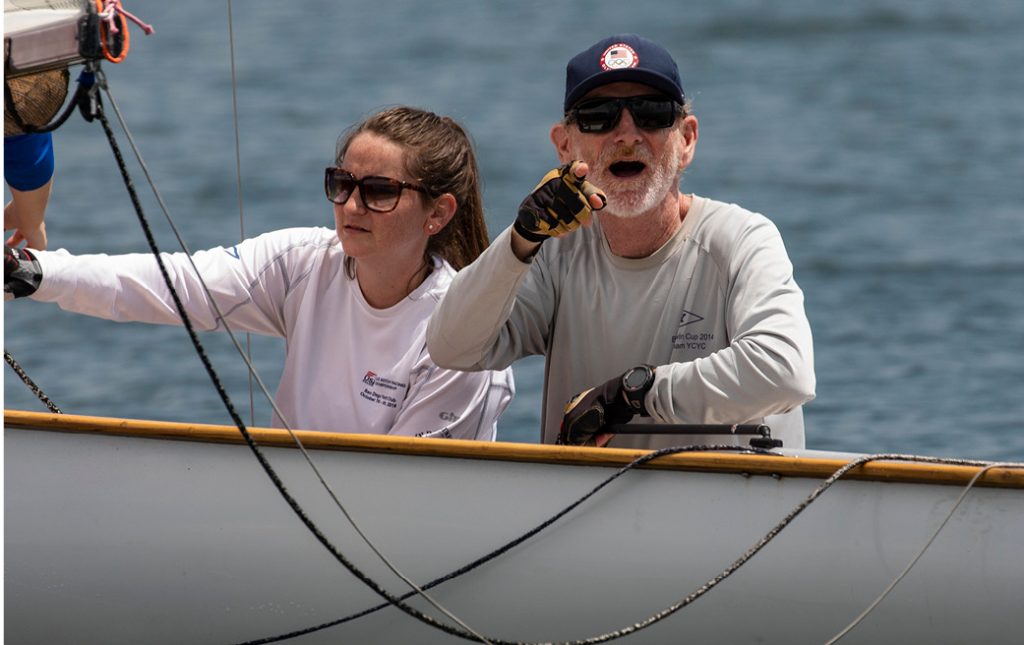A number of years ago, I read a quote from four-time Olympic gold medalist Paul Elvstrøm. His words seemed so true they have stuck with me ever since. He said, “The good sailors all know how to race very well, but the champions have won the regatta before the racing even begins.” In other words, preparation (i.e. everything you do to get ready for the start of the first race) is super important.
Unfortunately, I didn’t have time to do a ton of sailing before the 2009 Thistle Nationals. We did race two regattas earlier in the summer and spent several days practicing. But for the most part I had to rely on what I learned during many prior years of sailing Thistles.
However, in the weeks leading up to the regatta I did spend a lot of time preparing my boat and mind. Here are some of the things I did.
Working on boatspeed
Good boatspeed wins races and also provides a confidence boost, so I spent most of my preparation time trying to make my boat faster.
Sails – I bought new sails in early summer (the class allows only one new suit of sails per year) and used them in one light-to-moderate weekend regatta. They were fast (and were ‘broken in’ just enough), so we saved them for Nationals.
Tuning – I spent a lot of time getting the rig tension, rake and mast bend just right. Then I marked all the settings clearly and carefully taped everything in place.
Hull – Three days before the Nationals, we turned the boat over on the grass and did a thorough bottom job using 800-grit wet/dry sandpaper, rubbing compound and teflon polish. Then, each day on the way out to the race course we used our sponge to wipe harbor scum off the waterline. We also worked hard to prepare the boat for light air and to make sure the hull was at minimum weight.

If you want a sailing CV as good Dave D., don’t forget preparation is key! © Stephen R Cloutier
Avoiding breakdowns
In a no-throwout series (or any other series for that matter), the last thing you want is a breakdown while racing. So, we spent a lot of time before the regatta going over anything on the boat that might possibly break. We replaced the vang line, checked all the hiking strap knots, installed a new universal for the hiking stick, used a retainer line at the end of the boom in case the outhaul broke, taped over any place where the spinnaker could have snagged and so on. We went over many of these things each day after sailing (and especially on the last morning when it was windy).
Even though I was on a mission to reduce weight in the boat, we always carried extra battens (in case one broke or popped out of the sail), some tools and an extra spinnaker pole (in case our primary pole broke or went for a swim!).
Preparing mentally
I do not feel ready to start a regatta until I know my boat is fast and I have taken care of all loose ends. One of my favorite days of that year was the Saturday before the Nationals when I spent eight hours working on my boat and tweaking every little thing that I had been meaning to do for a long time. At the end of that day I felt relaxed and confident and ready to go.
Besides the psychology of being prepared, there are a few other things I usually do to get ready mentally. One is to develop a broad strategic plan for the regatta. Another is to have a thorough understanding of all the rules that govern the event (e.g. the SIs, NOR, racing rules, class rules).
Finally, for long regattas like this it is very helpful for me to have certain routines, both on the water and off. For example, every morning I went to the club early so I could put the boat in the water without a hassle. This started the day calmly and let me relax before going out. ■
This article originally appeared in David Dellenbaugh’s Speed & Smarts, The newsletter of how-to tips for racing sailors. If you want to sail faster and smarter, log onto SpeedandSmarts.com.
A resident of Easton, CT, Dellenbaugh was tactician and starting helmsman for America3’s successful defense of the America’s Cup in 1992. He’s a Lightning World Champion, two-time Congressional Cup winner, seven-time Thistle National Champion, two-time winner of the Canada’s Cup, three-time Prince of Wales U.S. Match Racing Champion, and a winner of the U.S. Team Racing Championships for the Hinman Trophy.



